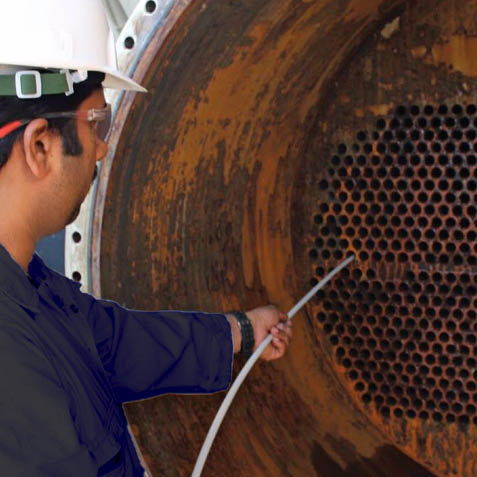Sigma provides ASNT/PCN/NAS-410 Level I, II, & III technicians and inspectors for Remote Field Testing (RFT) to detect anomalies and metal loss in heat exchanger tubes.
RFT is an NDT/NDE method using low-frequency AC to find defects in steel pipes and tubes. An RFT probe is moved down the inside of a tube/pipe and can detect inside and outside defects with equal sensitivity (although RFT cannot discriminate between the two). RFT works on nonferromagnetic materials such as copper and brass.
The basic RFT probe consists of an exciter coil (also known as a transmit or send coil) which sends a signal to the detector (or receive coil). The exciter coil is pumped with an AC current and emits a magnetic field. The field travels outwards from the exciter coil, through the pipe wall, and along the pipe. The detector is placed inside the pipe two to three pipe diameters away from the exciter and detects the magnetic field that has travelled back in from the outside of the pipe wall (for a total of two through-wall transits). In areas of metal loss, the field arrives at the detector with a faster travel time (greater phase) and greater signal strength (amplitude) due to the reduced path through the steel. The dominant mechanism of RFT is through-transmission.
The technician analyses these measurements to determine the mechanical integrity of the tube/pipe and makes a pass/fail recommendation for plugging.
Certified technicians are available for call-out or long-term assignments. Sigma provides turnkey RFT inspection and reporting complete with equipment, consumables, vehicles (mileage), and accommodations required to perform Tubular Testing.
